 MyDogBreeds
MyDogBreeds McNab is originated from United States but Braque Francais is originated from France. Both McNab and Braque Francais are having almost same height. McNab may weigh 25 kg / 55 pounds lesser than Braque Francais. Both McNab and Braque Francais has same life span. McNab may have less litter size than Braque Francais. Both McNab and Braque Francais requires Low maintenance.
McNab is originated from United States but Braque Francais is originated from France. Both McNab and Braque Francais are having almost same height. McNab may weigh 25 kg / 55 pounds lesser than Braque Francais. Both McNab and Braque Francais has same life span. McNab may have less litter size than Braque Francais. Both McNab and Braque Francais requires Low maintenance.
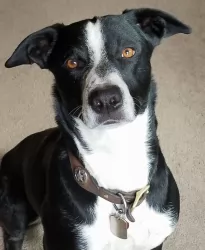 The attractive McNab dog is also known as the McNab Shepherd or McNab Collie. This very lively dog originated in the Mendocino region of Northern California, being specifically bred to withstand tough weather conditions and rough terrain.
The attractive McNab dog is also known as the McNab Shepherd or McNab Collie. This very lively dog originated in the Mendocino region of Northern California, being specifically bred to withstand tough weather conditions and rough terrain.
The dog is becoming popular outside of California now. A Scottish rancher with the surname McNab left Scotland and arrived in California in the 19th century. He crossed Scottish Border Collies with Shepherd dogs and the ranchers in California started using these dogs for herding livestock.
Today they are still being used as herding dogs in California and other countries. The dog isn’t recognized by the American Kennel Club. It was in 2014 that a group of McNab Shepherd breeders established the McNab Shepherd Registry so as to work towards the advancement of the McNab Shepherd.
 Braque Francais was at first one general breed of hounds in the Gascognes and Pyrenees Mountains areas of France. The one breed became two. Known as the Braque Francais Gascognes and the Braque Francais Pyrenees - two separate breeds of very alike dogs. The Gascognes is a lot less common than his smaller brother. Not very much is known about the beginnings of these two strains of Braque Francais as the breed has been around since at least the 15th century. Because the Braque Francais was exported or taken to so many different countries in the 15th-18th centuries, a lot of the origins of the breeds were lost. A major bloodline search was The conducted in the 19th century and found that these were two very distinct breeds of dog.
Braque Francais was at first one general breed of hounds in the Gascognes and Pyrenees Mountains areas of France. The one breed became two. Known as the Braque Francais Gascognes and the Braque Francais Pyrenees - two separate breeds of very alike dogs. The Gascognes is a lot less common than his smaller brother. Not very much is known about the beginnings of these two strains of Braque Francais as the breed has been around since at least the 15th century. Because the Braque Francais was exported or taken to so many different countries in the 15th-18th centuries, a lot of the origins of the breeds were lost. A major bloodline search was The conducted in the 19th century and found that these were two very distinct breeds of dog.
It is known that France was the birthplace of this breed and it was developed because of a need for a tracker that could point, flush and retrieve. The Braque Francais Gascogne probably came from the south of France. It is related to the German Shorthair Pointer and the English Pointer as well. Having existed since the 15th century, he was the father of all pointing dogs in France. By the 17th century the breed had grown enough to be called the “old style Braque Francais”,
Though the origin of the breed is not known there are of course several theories about it. The most prevalent belief is that the Braque Francais Gascogne is a descendent of the Chien d’Oysel, a spaniel breed of medium size and white or brown with brown markings. The Chien d’Oysel is an ancient breed used for hunting prior to the 13th century. Hunters crossed the Chien with local dogs on a routine basis.
Braque Francais came out of these breedings. It was probably French Scent hounds that created the larger size of the Gascogne. This also increased the stamina and strength of the Gascogne as opposed to the Pyrenees. There was also a mixing in of the Grand Bleu De Gasgogne and the Petit Bleu De Gasgogne.
The other prominent theory is that this breed the Gasgogne was actually developed from the Portugese, Spanish and Italian pointers rather than the French dogs. These dogs originated not with the Chien d’Oysel but with the scent hounds. From these dogs came the Spanish and English Pointers. All that is truly known is that all of these types of dogs were present in Europe by the fifteenth century and were moved among countries and cross bred regularly. However in the part of France called the Central Pyrenees region and in a small southern part of France the original, old style Braque Francais was pure bred. This aspect of the breed contributed to the development of all of the French pointers and European shorthaired dogs. By the end of the 1800’s today’s breed was developed.
In 1850 the first Braque Francais breed club was established and in the breed standards for both dogs followed in 1880. They were then registered in the French Kennel Club and the International Kennel Club (FCI). The French Kennel Club does not allow dogs with any common ancestors in Generations 1-3 into the Club in order to keep out the practice of inbreeding. In Canada only the Gascogne is recognized and the United States’ United Kennel Club (UKC) recognizes both. The American Kennel Club (AKC) does not recognize either.
With most local regions and countries choosing their local dogs over other breeds, the Braque Francais Gascogne has become fairly rare outside of France where the breed was the most popular gun dog throughout the 1700’s. The Gascogne was mostly a dog of the hunting nobility because of its size and food needs. Following the French Revolution, the breed fell off dramatically, while the smaller Pyrenees continued to thrive. This was because in the Pyrenees Mountains and the Southwestern region of Gascony, the English Pointer never supplanted the Braque Francais.
The Second World War was brutal to the Braque Francais Gascognes and as it recovered it became much less common than its sister breed. Today it is found almost exclusively in France.
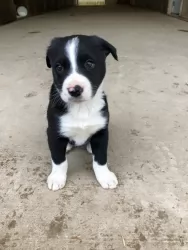 The McNab Dog is a medium-sized working dog. The appearance of this dog varies quite a bit. For instance you may come across a dog with erect ears or floppy ears or a long tail or one that is naturally bobbed.
The McNab Dog is a medium-sized working dog. The appearance of this dog varies quite a bit. For instance you may come across a dog with erect ears or floppy ears or a long tail or one that is naturally bobbed.
When it comes to size, you will find that between the males and females they stand at roughly 40 – 64cm and weigh anything from 14 – 30kg.
Most of these McNabs are black or red with white feet, white tipped tails and white markings around the face. The coat is weather resistant and fairly short and dense. You also get tri-colored McNabs. Eyes are usually a brown or copper color though you might find some with bluish eyes as well.
These are such intelligent dogs so with training and socialization you’ll find he is able to learn easily and quickly. He is a self assured dog, so he will respond well to an owner who is firm and fair, patient, kind and consistent.
He is best suited to life in the country as he needs lots of place to run around. If you don’t live on a farm, take the dog for long walks every day as he requires lots of exercise and mental stimulation. He is a loving family member too, getting along well with kids in the home as well as other pets. He is also a good guard- and watch dog, taking his job as protector of his human family very seriously.
 The Braque Francais Gascogne is a larger dog than the Pyrenees breed and is a very handsome dog. Both have a deep chest, a solid bodies, strong and slender legs and are well-proportioned. They have padded, round paws and a large brown head with floppy ears. The muzzle is a pointed block and he has a scissors bite, with a black nose and dark or amber eyes. The eyes are very expressive and round. The tail can be straight and long, or it can be docked. They are tall and athletic.
The Braque Francais Gascogne is a larger dog than the Pyrenees breed and is a very handsome dog. Both have a deep chest, a solid bodies, strong and slender legs and are well-proportioned. They have padded, round paws and a large brown head with floppy ears. The muzzle is a pointed block and he has a scissors bite, with a black nose and dark or amber eyes. The eyes are very expressive and round. The tail can be straight and long, or it can be docked. They are tall and athletic.
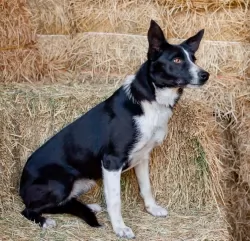 The McNab makes a splendid pet and is known to be even-tempered, being friendly and tolerant with his entire human family.
The McNab makes a splendid pet and is known to be even-tempered, being friendly and tolerant with his entire human family.
He gets on well with children in the home as well as other pets. He has always been a hard working pet and doubles up as being an excellent guard dog too. Those who have had the McNab as a pet say that you couldn’t get a more excellent family canine friend.
 This is a working breed, but they are nevertheless friendly and loyal to their families. They want to please their people and are usually docile. They love kids and are good as a first ever dog. They are friendly and even-tempered. They tolerate people they do not know but can be shy and are not guard dogs. instead they are loving, affectionate and people oriented. They need to be with their families and never left outside alone. They can develop separation anxiety.
This is a working breed, but they are nevertheless friendly and loyal to their families. They want to please their people and are usually docile. They love kids and are good as a first ever dog. They are friendly and even-tempered. They tolerate people they do not know but can be shy and are not guard dogs. instead they are loving, affectionate and people oriented. They need to be with their families and never left outside alone. They can develop separation anxiety.
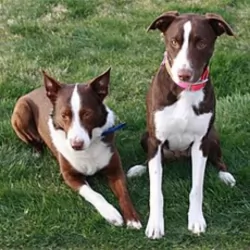 This dog doesn’t really have genetic health issues, but they can suffer with hip dysplasia, a problem that many dogs battle with, whether small or large, young or old.
This dog doesn’t really have genetic health issues, but they can suffer with hip dysplasia, a problem that many dogs battle with, whether small or large, young or old.
They can also suffer with epilepsy and an eye disease such as entropion where the lid of the eye is turned inwards. Check its ears and teeth regularly for infections and keep up to date with his vaccinations.
The McNab is a health dog breed so you aren't likely to face any of these common dog health issues.
 The Braque Francais is a fairly healthy breed. They are susceptible to certain health conditions that most dogs of their size and working history are susceptible to. These include Patellar luxation which seems to be one of the most common problems for them. They also can have hip and/or elbow dysplasia, aortic stenosis which is a narrowing of the aorta, and some eye issues such as ectropion, entropion, and PRA (Progressive Retinal Atrophy as well as cataracts.
The Braque Francais is a fairly healthy breed. They are susceptible to certain health conditions that most dogs of their size and working history are susceptible to. These include Patellar luxation which seems to be one of the most common problems for them. They also can have hip and/or elbow dysplasia, aortic stenosis which is a narrowing of the aorta, and some eye issues such as ectropion, entropion, and PRA (Progressive Retinal Atrophy as well as cataracts.
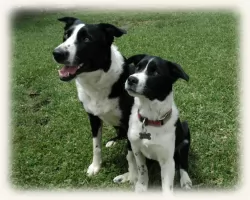 You can feed your McNab dog commercial dry kibble, but then you want to be sure its the best quality one. Buying inferior foods means that you’re getting a whole lot of ingredients in the food that are bad – sugar, salt, preservatives, fillers, colorants etc. Rather go for the best brands that will ensure that your dog is getting all the vitamins and minerals he needs.
You can feed your McNab dog commercial dry kibble, but then you want to be sure its the best quality one. Buying inferior foods means that you’re getting a whole lot of ingredients in the food that are bad – sugar, salt, preservatives, fillers, colorants etc. Rather go for the best brands that will ensure that your dog is getting all the vitamins and minerals he needs.
Homemade food is also important and foods such as boiled chicken, brown rice and pasta as well as cooked or raw vegetables chopped up and added to his dry kibble can make for a delicious, wholesome treat. It will be to his benefit if you can every now and then give him some raw meat as well. Make sure to see that he has a constant supply of fresh, cool water.
McNab Shepherds are very active dogs and they are going to require quite a bit of physical exercise as well as mental stimulation. They are dogs who have been used to herding livestock and he loves this busy life. It is why he wouldn’t be happy living in the city but is better suited to farm life or in a home with a large garden. Long walks and hikes will suit him as well as swimming and joining in every game there is.
The McNab is considered to be a low maintenance dog and grooming the short thick coat will be required twice a week. Always check around the eyes and ears as well as inside the mouth for problems and infections.
 This is a high energy, working dog with a need for a high-quality energy food or raw food that you make up yourself. Be sure to include chicken, beef and fish. Feed him about 3 cups once a day or 1.5 cups twice a day.
This is a high energy, working dog with a need for a high-quality energy food or raw food that you make up yourself. Be sure to include chicken, beef and fish. Feed him about 3 cups once a day or 1.5 cups twice a day.
In addition to the conditions listed above, his long floppy ears can lead to ear infections if not cared for. Wash them out daily. He is also susceptible to bloat so don’t feed him large meals and don’t let him exercise or work right before or right after exercise.
These dogs have a variety of hunting skills. They are not only pointers but can flush, trail and retrieve. The Gascogne is not as quick as the Pyrenees. They need a lot of exercise daily or they need a hunting job. They would do well with barn hunt, lure coursing and free play in an off leash fenced in area. If they don’t get rid of their energy, they can be destructive. They were bred to hunt and cannot resist the chase,